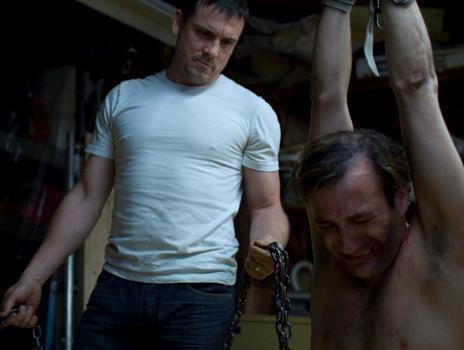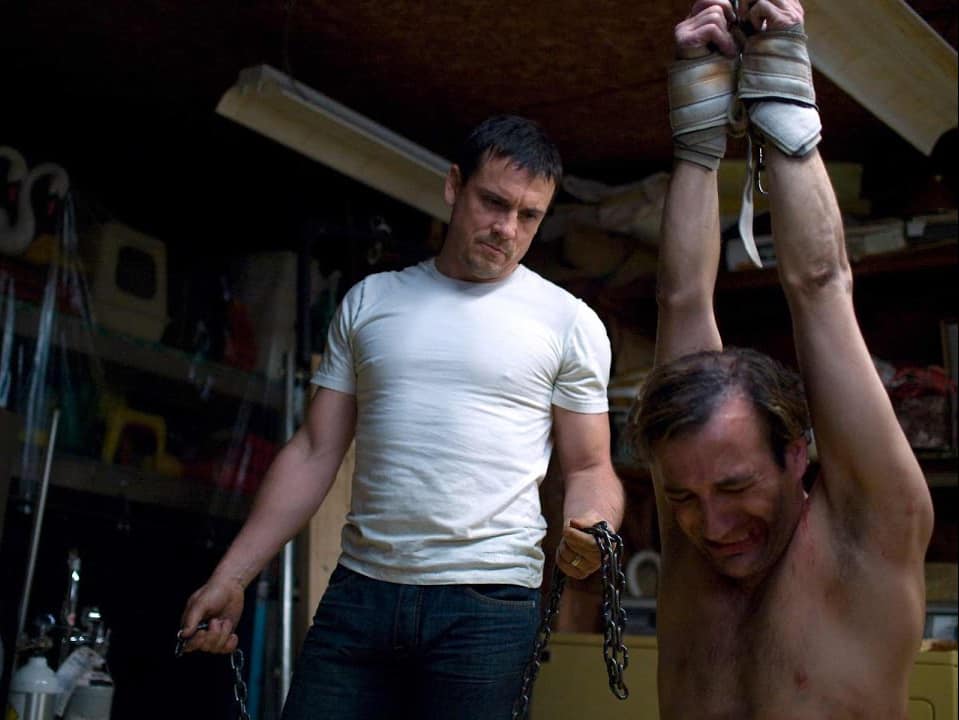Is it better to start strong or to finish with a bang? Obviously, achieving both and never letting go in between is best, but it’s not that common for a movie to maintain greatness consistently from beginning to end. The reason why I’m asking myself that question is that often times, an amazing last act will make you forgive a limp opening and other flaws that came before, simply because you leave the theater on such a high. Whereas if the conclusion of a film isn’t all that, you may come out feeling disappointed, even if the rest of it was pretty damn great.
So yeah, save for the nicely ambiguous last few lines of dialogue, the final stretch of this adaptation of horror writer Patrick Senécal‘s “Les Sept jours du talion” is kind of problematic. I won’t spoil anything, but I’m thinking specifically of the twist involving Pascale Delhaes‘s character and of the “dream” sequence. Furthermore, from the get-go, I could have done without all the business around Rémy Girard‘s police detective and the sometimes clumsy way TV news reports are used to convey information.
That being said, going back to the beginning, this first feature from Daniel Grou (who’s been directing television series in Québec for years under the moniker Podz), which recently premiered at Sundance, has much to offer. The pre-title sequence is admirably economical, establishing everything we need to know mostly through visual storytelling, with minimal dialogue. We meet a man (Claude Legault), his wife (Fanny Mallette) and the 8-year-old daughter (Rose-Marie Coallier) he loves more than anything in the world. Shortly thereafter, the kid disappears. Cops are called. With them, the man goes around, retracing the way his daughter usually took to walk to school, the field where she played with her friends… And then, just like that, they find her. Dead. Raped.
Everything that follows is the consequence of that early sequence. Basically, Legault’s character, who happens to be a doctor and, consequentially, to have considerable resources, uses them to work his way towards the point where he’s 1) broken out his daughter’s killer (Martin Dubreuil) from police custody, 2) taken him to a secluded cabin in the woods, and 3) arranged everything so that he can spend the next 7 days alone with Mr. Soon-To-Be-Living-The-Rest-of-His-Short-Ass-Life-In-Agonizing-Pain Rapist, as Marsellus Wallace would say.

Up to this point, Legault remains calm, methodical, clinical in his actions, and behind the camera, Grou does the same. His mise en scène is very sober, with deliberate pacing, no music, and muted cinematography in blue and gray hues, with things moving in and out of frame, in and out of focus… In a not so specific way, this made me think of M. Night Shyamalan’s visual style; the fact that the film is about how people deal with grief, like many of the “Sixth Sense” director’s films, only furthered this impression.
Now, once the torture begins, of course, it’s another story. “Les Sept jours du talion” still refrains from flashiness and from reveling in gore, but by definition, the depiction of a naked, chained up, pathetic worm of a human being suffering to the hands of another can’t help but be messy. Physically, psychologically, emotionally, spiritually, name it. To quote Hattori Hanzo, “Revenge is never a straight line. It’s a forest, And like a forest it’s easy to lose your way… To get lost… To forget where you came in.”
If, following the masterful set-up, the rest of the film had all been a relentless huis clos between Legault and Dubreuil, who both deliver riveting performances, “Les Sept jours du talion” could have been a near-masterpiece. I suppose the argument for cutting away to the cops and to the TV news now and then is to give the audience a break from the violence, while also providing more context around what’s going on in the cabin. But as mentioned, the stuff with Girard in particular is mediocre at best, and constantly returning to it somewhat undermines the intensity built during the Legault/Dubreuil scenes. Still, on the whole, considering as well the fact that the last act is not as strong as (most of) what came before, the positives clearly outweigh the negatives.


